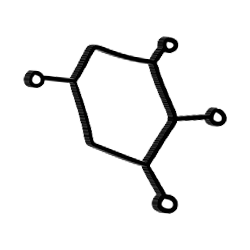A Key Indicator of Liver and Red Blood Cell Health
What Urobilinogen can tell you about your health.
What is Urobilinogen in Urine?
Urobilinogen is a byproduct that forms when your body breaks down bilirubin, a yellowish pigment produced during the normal degradation of red blood cells. When red blood cells age or become damaged, the body breaks them down, producing bilirubin as a waste product. The liver plays a key role in processing this bilirubin. It converts bilirubin into a form that can be either excreted from the body or further processed. Some of this bilirubin is transformed into urobilinogen in the intestines. While a portion of urobilinogen is reabsorbed and reused, the rest is excreted through urine.
Testing for urobilinogen levels in urine can provide essential insights into how efficiently your liver is functioning and how well your body is managing the breakdown and turnover of red blood cells. Abnormal urobilinogen levels may indicate potential liver problems or issues with red blood cell production or destruction. Regular monitoring of urobilinogen levels helps assess liver health and detect potential conditions early, such as liver disease, bile duct blockages, or hemolytic anemia, all of which can affect the body’s ability to process and excrete bilirubin properly. By tracking urobilinogen in your urine, you can gain a better understanding of your overall liver function and red blood cell health, making it an important biomarker for comprehensive health monitoring.
What can the test tell you
A urine test for urobilinogen helps gauge how well your liver is functioning and how your body is handling the breakdown of red blood cells

Urobilinogen Detected at Normal Levels
A small amount of urobilinogen in your urine is typical and generally indicates that your liver is functioning well. It shows that your body is breaking down red blood cells efficiently and processing bilirubin as expected. This suggests a healthy balance between liver function and red blood cell turnover.
Urobilinogen is Elevated
Higher-than-normal levels of urobilinogen may suggest that your liver is struggling to process bilirubin. This can occur with liver conditions like hepatitis or cirrhosis, or from an increased breakdown of red blood cells (hemolytic anemia). Elevated levels point to possible liver dysfunction or increased red blood cell destruction.
Urobilinogen is Low or Absent
Low or undetectable urobilinogen levels might indicate a blockage in bile flow, such as from gallstones, or decreased liver function. This can prevent bilirubin from entering the intestines to be processed. A lack of urobilinogen suggests potential issues with bile production or liver processing.
Why Urobilinogen Levels Matter for Your Health
Urobilinogen levels can reveal important information about your liver’s ability to process waste products and how well your body is managing red blood cell breakdown. Elevated levels may indicate liver disease, while low levels could suggest bile duct obstructions or liver dysfunction. In both cases, addressing these issues early is key to avoiding more serious health complications.
Who should consider Testing?
If you have liver concerns
People with liver conditions such as hepatitis, cirrhosis, or fatty liver disease may benefit from monitoring urobilinogen to assess liver function.
If you experience jaundice (yellowing of the skin or eyes)
Jaundice can be a sign that your liver isn’t processing bilirubin properly, and urobilinogen testing may help provide more insights.
If you suspect bile duct issues
Symptoms like dark urine, pale stools, or abdominal pain may indicate a bile duct blockage, and urobilinogen levels can provide clues.
If you have a condition affecting red blood cells
Conditions like hemolytic anemia, where red blood cells are broken down at a faster rate, may show elevated urobilinogen levels.
Why testing is important
Testing your urobilinogen levels can help identify potential liver or bile duct issues early on. Whether your liver is overburdened, or there’s a blockage preventing normal bile flow, a urine test can provide crucial insights that guide your next steps toward maintaining liver health and overall wellness.
Your liver plays a vital role in processing waste and breaking down red blood cells, and monitoring urobilinogen levels in your urine is an easy way to stay informed about your liver and blood health. Keeping an eye on these levels can help you catch imbalances early and take proactive steps for your well-being.
Our Biomarkers
Our iOS and Android compatible app will analyze results provided by our Urine test kit to provide recommendations and knowledge on 18 different biomarkers. Click on any of the 18 biomarkers to learn more.
Testimonials 😍
Beta testers and customers all over the world love Welleys!
I was amazed at how detailed and easy this test was to use. The app explained my results clearly, and I learned that my magnesium levels were lower than ideal. Thanks to Welleys, I’ve adjusted my diet, and I feel much more energized now.
Emily Carter
This test was such a relief for me. I had been worried about my glucose levels, and Welleys gave me the answers I needed in just a few minutes. The app even recommended hydration tips that were easy to follow.
Wei Zhang
Welleys has been a game-changer for my health routine. I discovered that my calcium levels were borderline low, and the app suggested foods that could help improve them. It’s so much more convenient than scheduling a doctor’s appointment!
Raj Patel
I never knew I could learn so much from an at-home test. Welleys helped me monitor my creatinine levels, which gave me peace of mind about my kidney health. The instructions were straightforward, and the app made it all so easy.
Maria Gonzalez
I’ve always been curious about how my lifestyle affects my health, and this test gave me answers. Finding out that my pH levels were slightly off helped me make small but meaningful adjustments to my water intake. Welleys is an incredible tool!
Michael Anderson
As someone who follows a ketogenic diet, I’ve been monitoring my ketones regularly. Welleys made it so simple to track them alongside glucose, and the insights into my overall health have been invaluable. I highly recommend it to anyone serious about wellness.
Priya Sharma
I was shocked at how detailed the results were! Welleys identified elevated protein levels in my urine, and I realized I needed to balance my diet better. This test gave me the push I needed to make healthier choices.
Antonio Ramirez
I’ve always struggled to stay hydrated, and Welleys confirmed this by showing I had elevated sodium levels and a high specific gravity. The app’s tips on proper hydration have made a noticeable difference in how I feel daily.
Sarah Mitchell
I was shocked at how detailed the results were! Welleys identified elevated protein levels in my urine, and I realized I needed to balance my diet better. This test gave me the push I needed to make healthier choices.


















